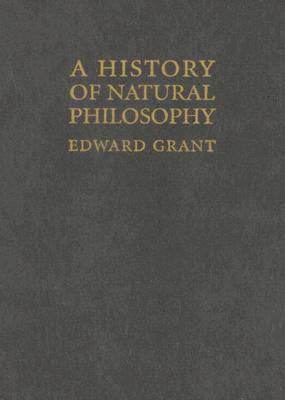
Door een staking bij bpost kan je online bestelling op dit moment iets langer onderweg zijn dan voorzien. Dringend iets nodig? Onze winkels ontvangen jou met open armen!
- Afhalen na 1 uur in een winkel met voorraad
- Gratis thuislevering in België vanaf € 30
- Ruim aanbod met 7 miljoen producten
Door een staking bij bpost kan je online bestelling op dit moment iets langer onderweg zijn dan voorzien. Dringend iets nodig? Onze winkels ontvangen jou met open armen!
- Afhalen na 1 uur in een winkel met voorraad
- Gratis thuislevering in België vanaf € 30
- Ruim aanbod met 7 miljoen producten
Zoeken
A History of Natural Philosophy
From the Ancient World to the Nineteenth Century
Edward Grant
Hardcover | Engels
€ 116,95
+ 233 punten
Uitvoering
Omschrijving
Natural philosophy encompassed all natural phenomena of the physical world. It sought to discover the physical causes of all natural effects and was little concerned with mathematics. By contrast, the exact mathematical sciences were narrowly confined to various computations that did not involve physical causes, functioning totally independently of natural philosophy. Although this began slowly to change in the late Middle Ages, a much more thoroughgoing union of natural philosophy and mathematics occurred in the seventeenth century and thereby made the Scientific Revolution possible. The title of Isaac Newton's great work, The Mathematical Principles of Natural Philosophy, perfectly reflects the new relationship. Natural philosophy became the 'Great Mother of the Sciences', which by the nineteenth century had nourished the manifold chemical, physical, and biological sciences to maturity, thus enabling them to leave the 'Great Mother' and emerge as the multiplicity of independent sciences we know today.
Specificaties
Betrokkenen
- Auteur(s):
- Uitgeverij:
Inhoud
- Aantal bladzijden:
- 376
- Taal:
- Engels
Eigenschappen
- Productcode (EAN):
- 9780521869317
- Verschijningsdatum:
- 29/01/2007
- Uitvoering:
- Hardcover
- Formaat:
- Genaaid
- Afmetingen:
- 163 mm x 234 mm
- Gewicht:
- 621 g

Alleen bij Standaard Boekhandel
+ 233 punten op je klantenkaart van Standaard Boekhandel
Beoordelingen
We publiceren alleen reviews die voldoen aan de voorwaarden voor reviews. Bekijk onze voorwaarden voor reviews.











